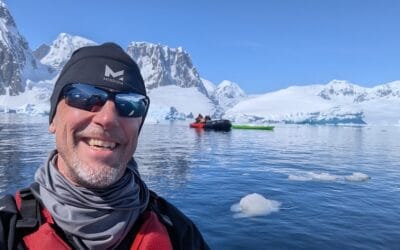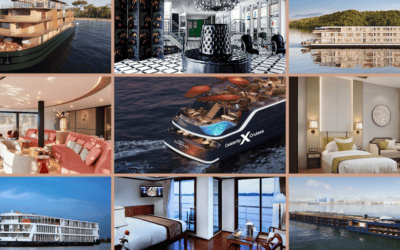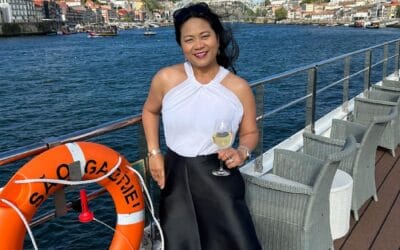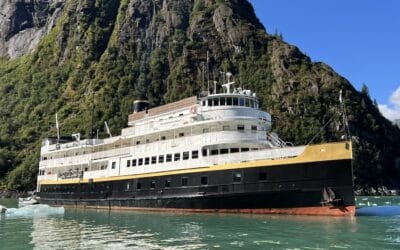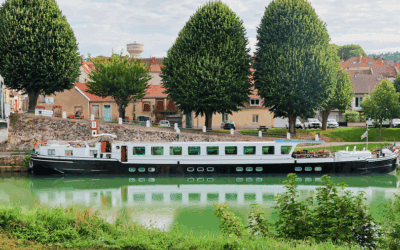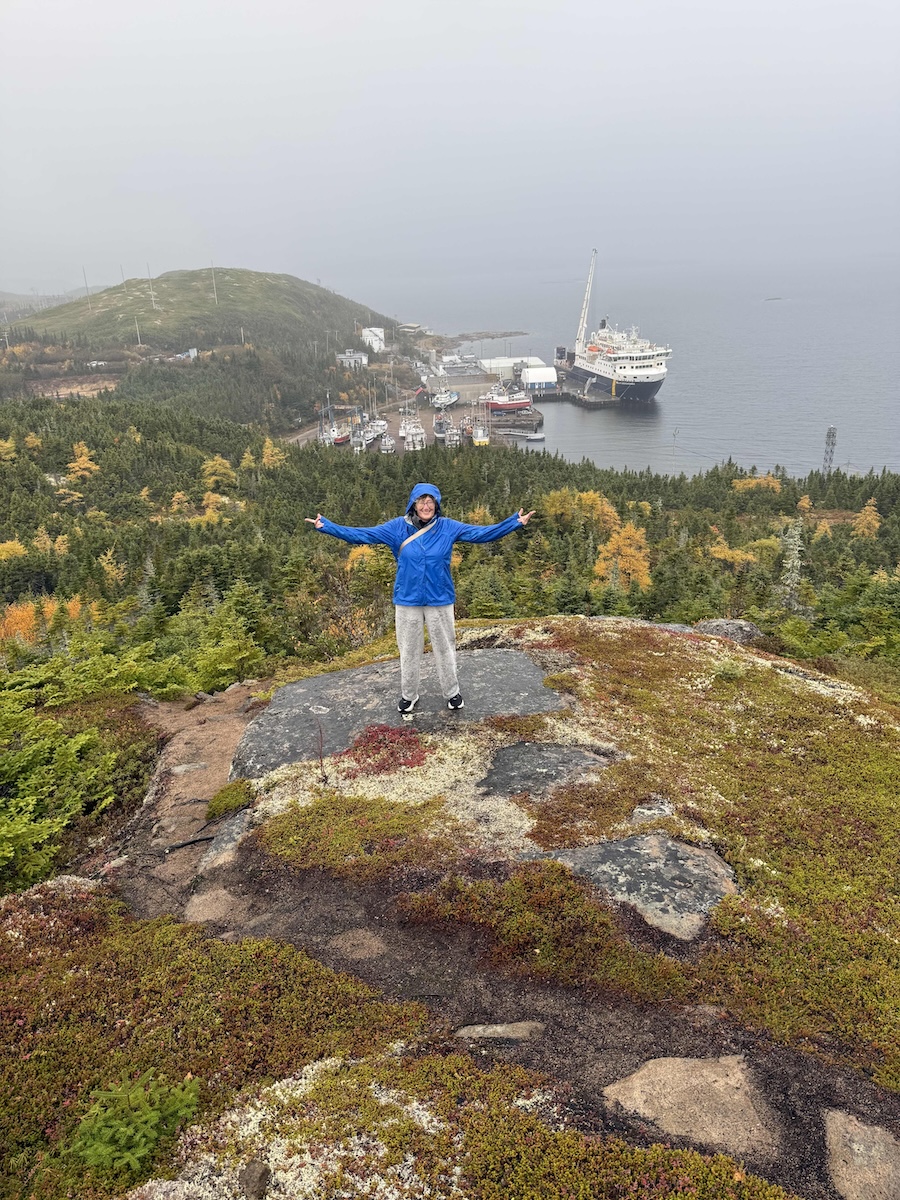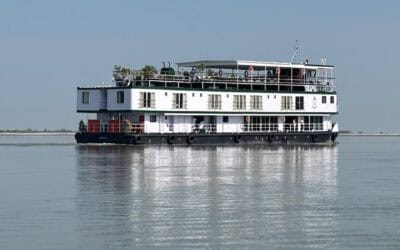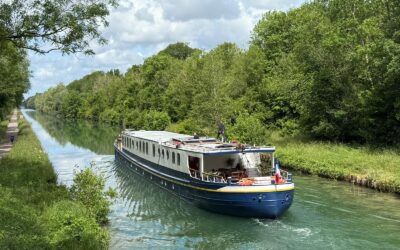Coral Expeditions Review
Coral Expeditions, based in Cairns, Queensland, Australia, got its start in 1984 as Coral Princess Cruises by refitting a WWII submarine chaser into a small passenger-carrying ship for Great Barrier Reef cruises. With this initial success, Coral Princess, a catamaran was added in 1988; Coral Princess II a second catamaran, in 1996; Oceanic Discoverer, a small oceangoing ship in 2005; and the expedition ship Coral Adventurer in 2019. Another expedition ship, Coral Geographer, made its debut in spring 2021.
Each new member of the fleet allowed itineraries to reach beyond the extremely well-covered Australian coastal regions to New Zealand, Indonesia, East Indies, Spice Islands, the South Pacific Islands. In 2015, the line renamed itself Coral Expeditions and Oceanic Discoverer was renamed Coral Discoverer.
The barrier reef cruises mainly frequent what are known as the ribbon reefs where the bleaching we hear about has had little impact. The line’s website has an information section composed by the line’s marine biologist about what is happening to the Great Barrier Reef due to climate change. While there is considerable damage, some sections have experienced recent recovery.
Fleet
Coral Discoverer (b. 2005 & 72 p) — Indian Ocean (The Kimberley, Australian north coast & Tasmania) & Coral Sea (Great Barrier Reef)
Coral Adventurer (b. 2019 & 120 p) — Indian Ocean & Coral Sea (The Kimberley, Australia circumnavigation & Indonesian islands)
Coral Geographer (b. 2021 & 120 p) — This ship will also permit cruises that circumnavigate the Australian continent, and no other lines have this thorough a program.
Passenger Profile: The line draws locally from Australia and New Zealand, also Britain, Europe, Canada and the U.S.
Price
$$ to $$$ Expensive/Very pricey.
Included Features
- All shore excursions
- All presentations & briefings
- Snorkeling & introductory scuba lesson
- All meals
- Select beer, wine, juices & soft drinks
- 24-hour coffee & tea
- Post-cruise transfer
- All fees & gratuities
Itineraries
With the addition of Coral Geographer, Coral Expeditions will be able add sailings to Indian Ocean islands, Sri Lanka and Eastern Africa, plus ports in Southeast Asia to its docket of mainly Australian and New Zealand destinations.
Great Barrier Reef cruises, roundtrip from Cairns, can last for 7 or 10 nights.
Tasmania trips include 10-night coastal cruises, including an Australian Geographic voyage, and a 16-night Tasmania circumnavigation cruise.
Australian coastal cruises include 10- to 19-night itineraries in The Kimberley and the northern coast, and a 59-night Australian complete circumnavigation journey.
Venturing along the remote Australian coasts:
Much of the Kimberley Coast is inaccessible except on foot or by boat. On my Kimberley cruise, I hooked an 80-pound shark, wrestling with it for over an hour before it broke the line. Darwin is worth a stopover for its WWII and devastating cyclone history, plus a natural history museum showcasing scary and truly weird Australian wildlife. Broome, a former pearl-diving center, has developed into a popular international resort town. — Ted Scull
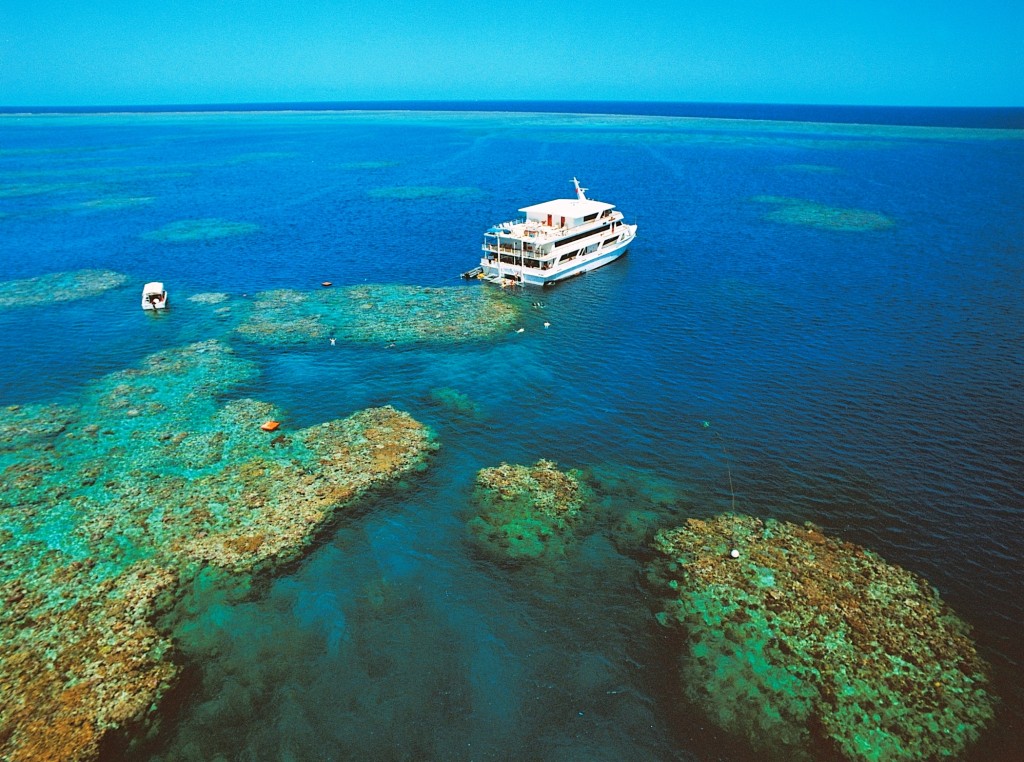
Glass bottom boat and snorkeling at The Great Barrier Reef. * Photo: Coral Expeditions
Sample Itinerary
The 10-night Coastal Wilds of Tasmania cruise begins at Hobart, sailing for Woodbridge and the Huon River; Port Davey and Bathurst Harbour; Bruny Islands and Adventure Bay; Maria Islands National Park; Freycinet National Park and Schouten Islands; and finally Port Arthur Historic Site before returning to Hobart.
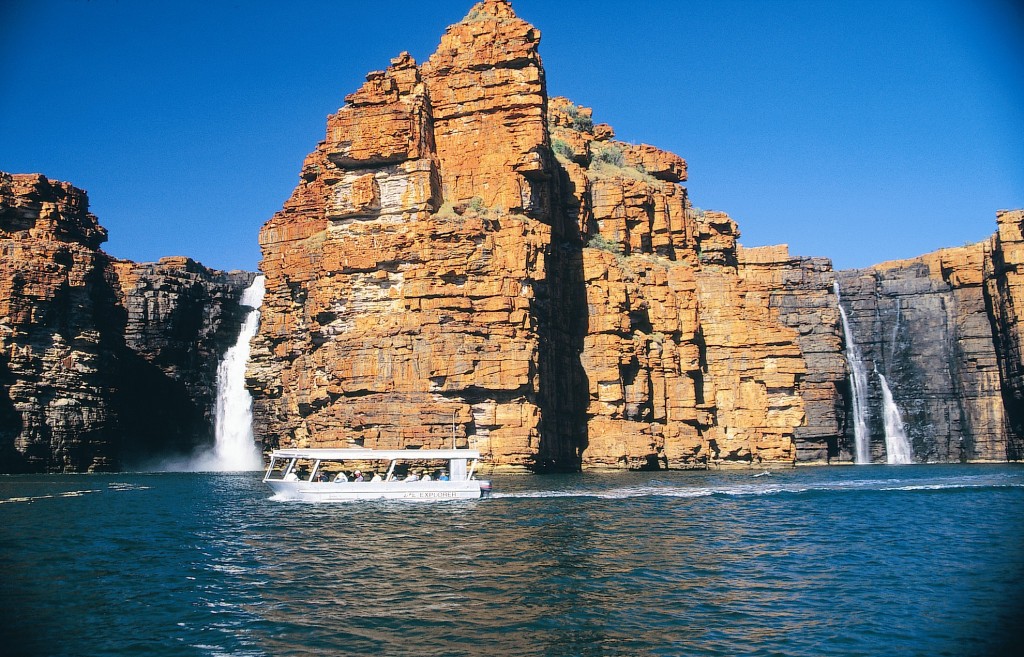
Cruising past waterfalls along the Kimberley Coast. * Photo: Coral Expeditions
Why Go?
Australia’s 1,400-mile Great Barrier Reef is home to over 1,500 fish species and 30 different mammals, while much of the remote northern coastal Outback is virtually devoid of human habitation and full of the freaks of nature.
Exploring by small ship is the only practical way to access the region. South Pacific island-hopping takes you to culturally distinct people and pristine atolls where nature abounds in the sea, air and on land. Most of New Zealand’s wildlife and man-made attractions are on or very near the coast.
New itineraries explore Eastern African regions not typically visited via any type of cruise.
Coral Expeditions’ three small ships carry only 42 to 72 passengers providing truly intimate shared experiences.
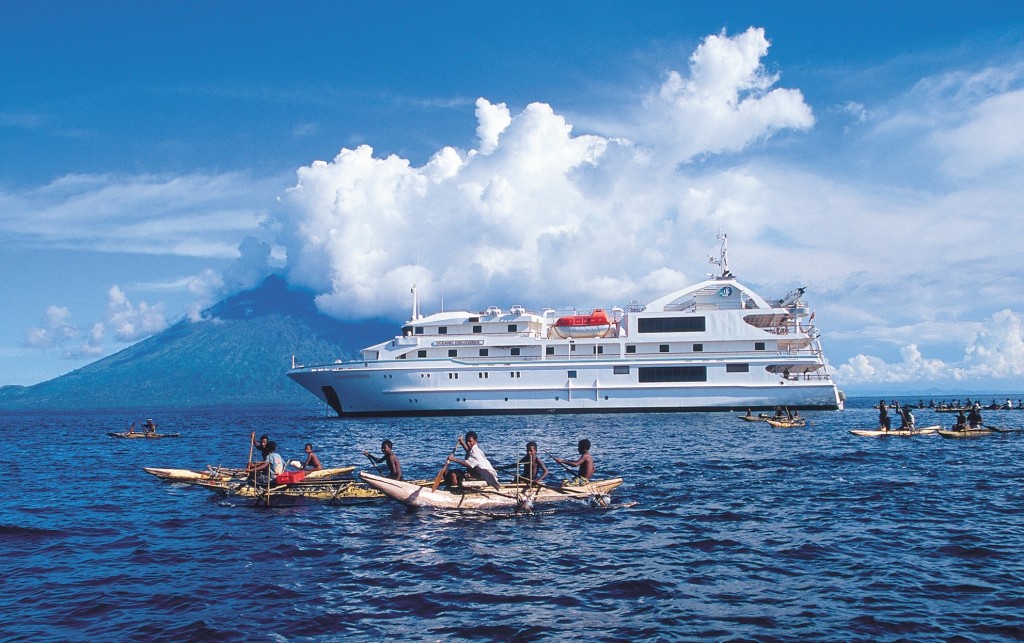
Coral Discoverer off Manum Island, Papua New Guinea. * Photo: Coral Expeditions
When to Go?
The height of the tourist season along the Great Barrier Reef is June to August after which the humidity begins to build and then the rains arrive in the peak of the summer between December and March.
However, the heat is less uncomfortable when at sea and while enjoying activities on and in the water. The other expeditions are geared to the best weather seasons.
Sustainability Initiatives
Accredited by Eco-Tourism Australia, Coral Expeditions has been found to meet the highest international standards on sustainability. The company works with a number of organizations involved in wildlife and environmental conservation, and is dedicated to teaching passengers about their work.
Coral Expeditions has removed all polycarbonate plastics, reduced food packaging and offer a selection of eco-friendly, organic and fair-trade beverages. They also provide marine friendly sunscreen to all passengers.
Activities & Entertainment
As a policy, Coral Expeditions doesn’t book onboard entertainment, instead opting for nightly presentations that could include talks, films or documentaries on related themes. All ships have an open bridge policy and Coral Adventurer conducts engine room tours. Meals are always casual, with no formal nights or assigned seating.
The company also doesn’t provide minibars, with the goal to have passengers socialize at one of the many conducive public spaces around the ship. None of the ships have pools, but passengers who want to swim can do so from the ship’s marine launch. There’s also kayaking and snorkel gear available.
The Xplorer tender vessel (Discoverer has one while Adventurer has two) seats all passengers and is hydraulically lifted and lowered for easy access to the main deck. Onboard Zodiacs provide close-up encounters with nature. As nature and wildlife feature prominently in shore excursions, it’s not usual to make stops at conservation organizations to observe and learn more about their work.
Be sure to read the report on the current condition of the Great Barrier Reef written by Coral Expeditions’ marine biologist.
SHIPS
Coral Expedition I
This 46-passenger twin-hulled catamaran was built for coastal Australia and the Great Barrier Reef. Four decks house a dining room with open seating, forward lounge with a reference library and plasma screens, sun deck with shaded area and outdoor bar, two cocktail bars, gift shops and an open bridge.
Cabins are en suite and Wi-Fi. Upper deck cabins measure from 151 sq. ft. to 185 sq. ft. with picture windows, while those on the lower deck are 108 sq. ft. with twin circle portholes.
Coral Expedition II
A catamaran with three decks, Coral Expedition II accommodates 42 passengers.
Coral Discoverer
A 72-passenger expedition ship, Coral Discoverer has four decks, accessed via stairwell only, with over 10,000 sq.ft. of open deck space including a wrap-around promenade deck.
Dining
A dining room serves up three meals; the cuisine on all Coral Expeditions cruises is simple and generous – Australian-influenced recipes with regional variations using local fresh and sustainable ingredients. Lunches feature soups and salads using local seafood and fruits.
The first dinner onboard is a seafood-sharing feast, while other nights there’s a three-course table d’hôte menu accompanied by a selection of wines, beers and ciders from Australia and New Zealand.
Public Rooms
Coral Discoverer has three fully-stocked bars, indoor and outdoor and on different decks, plus a large forward lounge for multi-media presentations with a reference library. The Sun Deck has plenty of seating and a shaded lounge. The ship also has a gift shop. Discoverer has two Zodiacs, plus kayaks and scuba equipment onboard. Wi-Fi is only available in public areas.
Cabins
Cabins on the lowest deck measure 195 sq. ft. and have just two portholes for views, while on the higher decks, cabins measure between 160 to 195 sq. ft. and have picture windows. A balcony category is 215 sq. ft.
In cabin: en suite, phone.
Coral Adventurer (2019)
An exploration ship made for the tropics, the 120-passenger Coral Adventurer has four decks accessed by elevator, with over 10,000 sq.ft. of open deck space including a wrap-around promenade deck.
Dining
A dining room serves up three meals; the cuisine on all Coral Expeditions cruises is simple and generous – Australian-influenced recipes with regional variations using local fresh and sustainable ingredients. Lunches feature soups and salads using local seafood and fruits.
The first dinner onboard is a seafood-sharing feast, while other nights there’s a three-course table d’hôte menu accompanied by a selection of wines, beers and ciders from Australia and New Zealand. The galley has a viewing window.
Public Rooms
There are three fully-stocked indoor and outdoor bars on various decks. There’s a large forward lounge for multi-media presentations with a reference library, a Navigator lounge where passengers can observe ship operations, and the Barralong Room for hosting scientific research and exhibitions.
The Sun Deck has plenty of seating and a shaded lounge. The ship also has a gym and gift shop. Dicsoverer has six Zodiacs. Wi-Fi is available in public areas.
Cabins
Most cabins have balconies, measuring 230 sq. ft. Smaller cabins, measuring 182 sq. ft., have porthole windows. Suite category cabins are 600 sq. ft. with balconies.
In cabin: en suite, phone, Wi-Fi.
Coral Geographer (2021) – is an enlarged Coral Adventurer with five decks. Most cabins have private balconies; lecture lounge and small library; navigator lounge on the bridge for viewing ship operations; passenger lift serves four decks; engine room tours (unusual); collection of indigenous art; two large tenders seats all passengers; six Zodiacs; active stabilizers; WiFi throughout.
Along the Same Lines
No other line offers such a comprehensive coverage of Australia, including the southern island of Tasmania.
Contact
Coral Expeditions
Cairns, Qld, Australia
In Australia; 1800 079 545
Outside Australia; +61 7 4040 9999
www.coralexpeditions.com
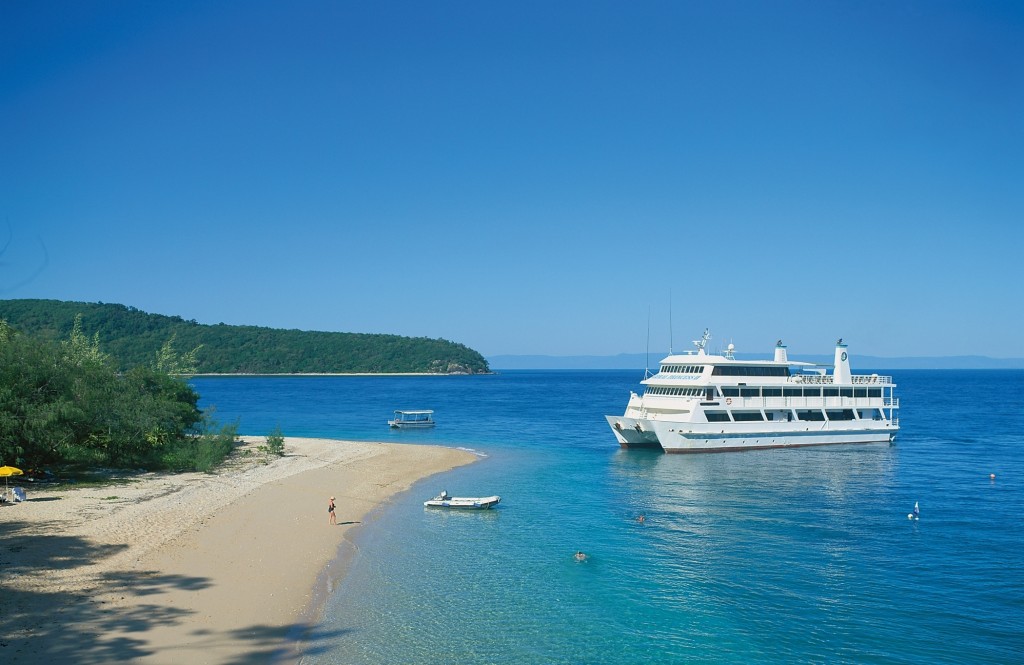
Going ashore along the Great Barrier Reef. * Photo: Coral Expeditions
— TWS
Don't miss a post, subscribe to QuirkyCruise.com HERE for monthly updates!
© This article is protected by copyright, no part may be reproduced by any process without written permission from the author. All Rights Reserved. QuirkyCruise.com.


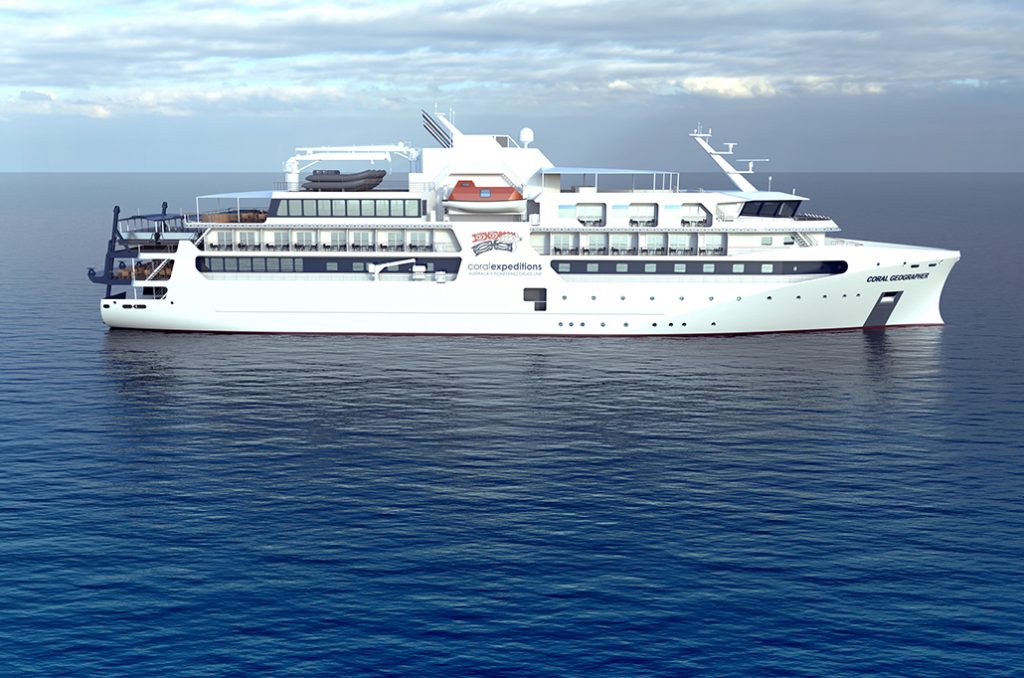
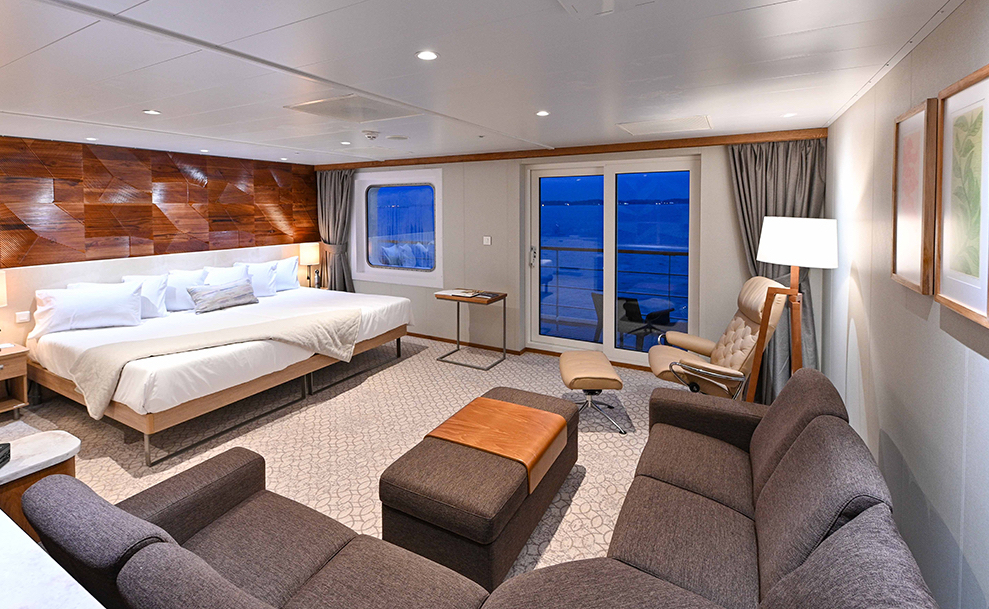
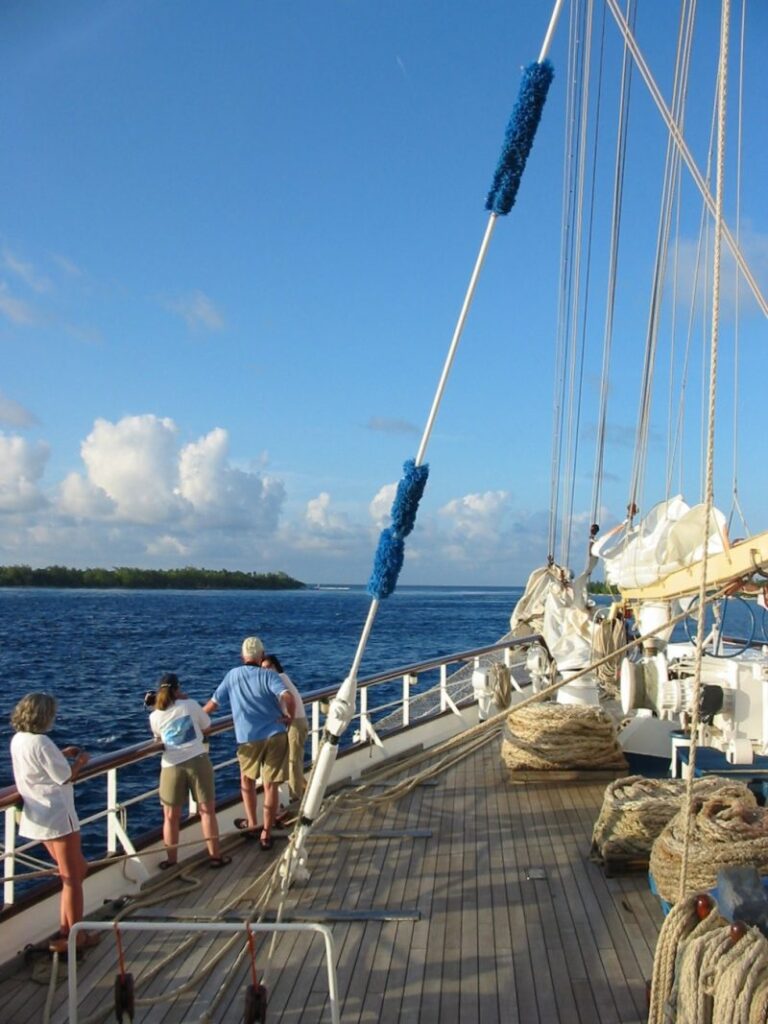
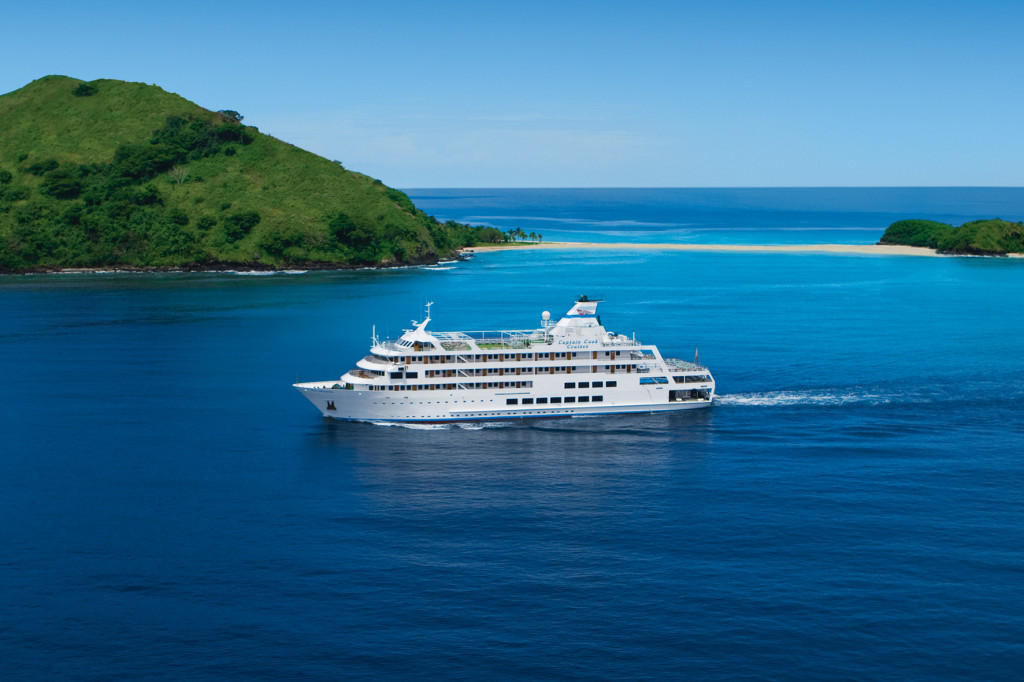

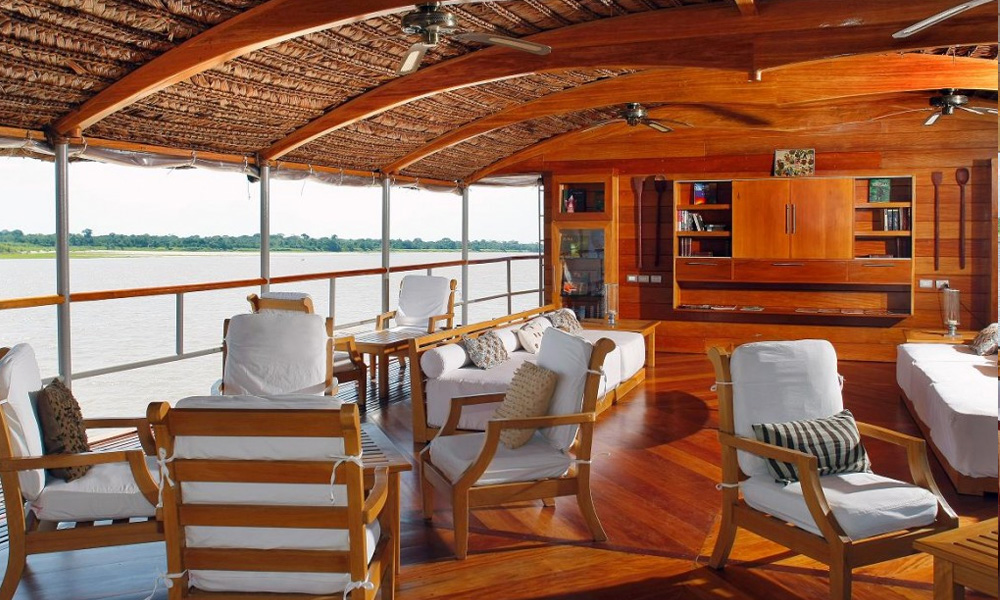

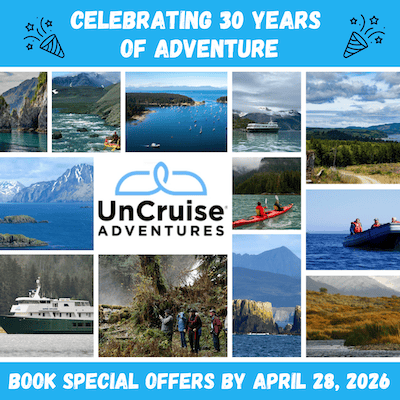
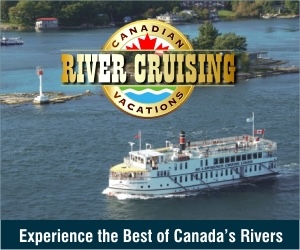

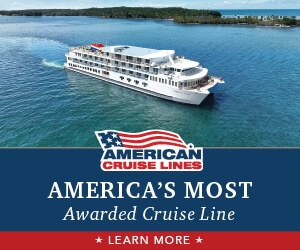

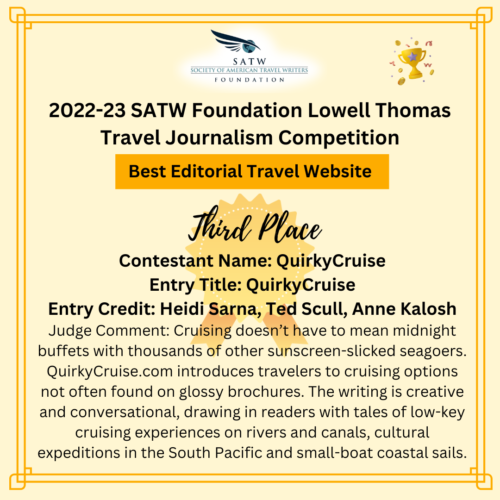


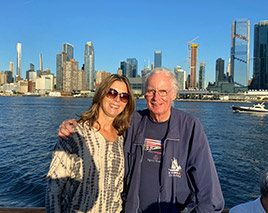 HEIDI SARNA
HEIDI SARNA
